14 Best Online Electronics Stores for Makers
Local electronics stores tend to offer a modest selection of components. While basic pieces may suffice for the average person who needs a quick repair or a small, simple device, in-person stores simply don’t cater to the Maker community. The more involved you get in the creation of electronic devices, the more you’ll find yourself searching for advanced and sophisticated hardware. Whether you’re an experienced Maker, a beginner DIYer, or a curious electronics enthusiast, there's a better chance you'll find what you're looking for online rather than in local stores. And with very low (or none) shipping fees, it's really a no-brainer.
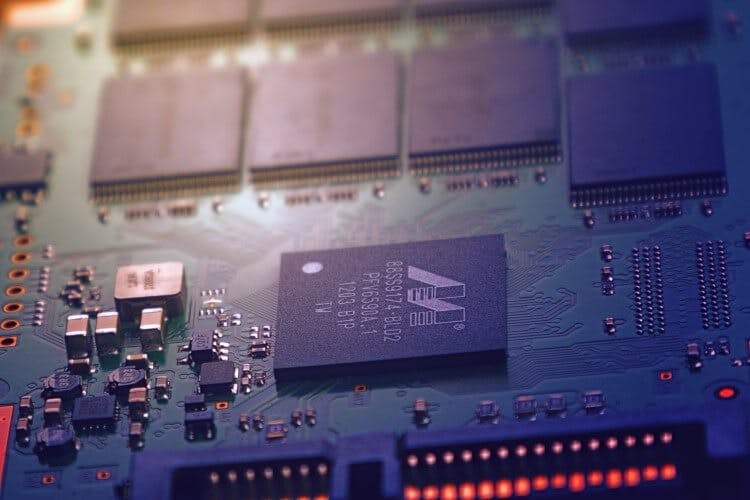
But first, let's talk a bit about Makers and electronic DIYers, and try to understand what their specific needs are.
Who Are the Makers?
Makers are creative DIYers, with a wide skillset. Many makers have a strong orientation for electronics and technology. They are interested in learning how things work and function and the intricacies of the creation process.
Chances are, if you’re a Maker, you:
- Create your own gadgets and contraptions
- Seek to improve or modify the behavior of existing mechanical items
Being a Maker is a hobby for some and a trade for others. Regardless of skill level, our fellow Makers know that the possibilities of technology are limited only by our imaginations. And, of course, the availability of parts to make those creative inventions come to life. That’s why access to quality electronic component retailers is crucial to the expansion of the Maker craft.
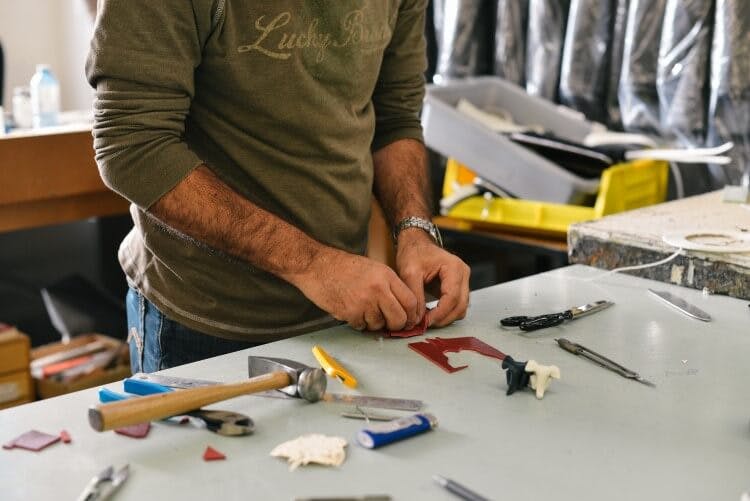
What Kinds of Components Do Makers Need?
Consider for a moment the inner workings of a robot’s build. There are hundreds of pieces that comprise its ability to function. From the gears to the power source and the careful soldering, each and every component makes a difference in the final product.
Now take that same robot and try to assemble it using only one-quarter of the parts you thought you would need. The difference between the first and second robot is the difference between a Maker shopping at a professional online retail store…or a bare-bones, local brick-and-mortar store.

Sure, they might have some of the basic tech equipment, but they surely won’t have all the inventory necessary for a professional designer.
Why Buy Online?
Local neighborhood electronics stores and even large ones don’t seem to carry the kind of specific components necessary for new creations or serious modifications. Therefore, searching for more niche-specific retailers is the only way to get the parts that you need. And those only exist online.
How to Choose the Best Store for Your Needs
While there are many online electronic shopping options available, there are a few criteria you can use to narrow down your search and find the right store on our list.
- The store should cater to your interests: Many online tech stores have devoted their inventory and content to specific niches. For example, some of the sites we’ve selected focus more on robotics, while others might favor machinery tech or model kits.
- They should have competitive prices: Compare websites’ overall competitiveness in your niche market. Some may have a few great deals in a sea of overpriced parts, some are more expensive, but offer a "one-stop-shop" buying experience so you can save a lot of time and energy.
- They should keep the stuff you need in stock: Is their core business based on the items you intend to use on a regular basis? The more readily available these components are, the less you have to slow down your created process while you wait for missing parts.

Without further ado, we present to you:
14 Online Electronics Stores for Makers and DIYers
Sites Made for Makers
The following online stores are the ones we found to be most focused on the Maker and DIY world. We sifted through many sites, but the ones that made the final cut had to:
- Stock specific hardware made especially for DIY projects.
- Value for money - with quality, available additions, and overall stock variety: It’s okay to be more expensive if you offer something no one else does.
- Put an emphasis on education and learning.
- Offer good documentation.
- Provide access to virtual and physical communities.
- Have a simple buying process.
- Manufacture components that are easy to wire and assemble (within reason) so that you get the best Making experience with minimum hassle.
- Put together kits and packs that bundle together everything you need for your project — a must-have offering for beginners.

SparkFun
Functionality
SparkFun is one of our favorite places to shop for electronics. One of the main reasons for this is the seamless user experience, both on the website and with the physical components and kits. This holds true for both beginner and experienced Makers.
The website is well-planned and balances educational and learning materials with a smooth shopping experience.
Documentation
SparkFun offers thorough documentation of all its components, including datasheets, start guides, code libraries, and more. According to Megan Arnold, SparkFun’s Public Relations Manager, SparkFun provides “instructional content in the form of tutorials, hook up guides, and project ideas to help get any Maker started on their projects and learn new skills.” The company truly is the full package in that regard, striving — successfully — to provide “all the resources a Maker needs to build a project.”
Variety
For the devoted Maker, SparkFun also offers an evolving stock of high-quality items, including “5-7 new products every week, some of which are developed in-house and some of them are curated from other suppliers.”
Customer-Driven Approach
SparkFun is a step above the crowd in that it is devoted to knowing users and their interests and giving those users the tools they need to make their visions a reality. According to the company, “We aim to be the first to discover the right tool, the right circuit board, or the right sensor that fits right into the types of projects we see from our community.”

What to Buy: LilyPad - Sewable Electronics
Celebrating 10 years this October, Lilypad is SparkFun’s sewable electronics ecosystem. Lilypad products are a great way to experiment with fabric electronics. They are available in a variety of shapes integrated into specific project kits but they can also be bought separately. Lilypad can also serve as a tool for educators. More info on how to do that in SparkFun’s education section here.
Seeed-Studio
Seeed Studio is designed around the Maker and DIY market. It approaches electronics enthusiasts at the entry level with tools like Grove, which help them create and prototype.
Beyond the Product
As you advance as Makers and want to create a product or a more professional project, Seeed can help you go to production with engineering and manufacturing services such as Seeed Fusion and Seeed Propagate. The company is unique in that it tries “to grow with our Maker customers as they gain new skills and ideas. Seeed is designed to stand alongside Makers as they grow.”
Fostering Community
Seeed also has a great community platform called Seeed.cc. Here In this section, you’ll find both user content and Seeed’s content. There are many detailed tutorials and on the right-hand side of every project or Recipe, as they are called, you can find a list of the components and add them to your cart immediately.
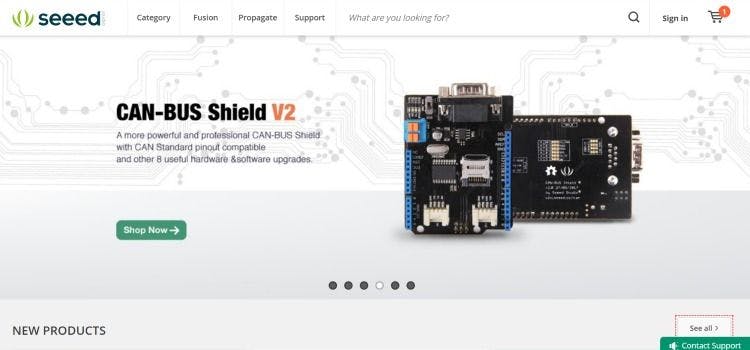
What to Buy: Grove
Seeed has developed a modular connector system called Grove. According to Seeed’s website: “Grove takes a building block approach to assembling electronics. Compared to the jumper- or solder-based system, it is easier to connect, experiment and build and simplifies the learning system, but not to the point where it becomes dumbed down.”
Grove offers an excellent starting point if you are hesitant about wiring and soldering. Solutions like Grove are a bit more expensive and somewhat less flexible than the classic wiring options. However, it is an excellent transition into the more versatile (and more difficult) systems.
Arduino
We can’t talk about the Maker market without mentioning Arduino. Arduino is much more than just a manufacturer or distributor, but it’s worthwhile to note that it sells products online, including:
- Arduino boards
- Kits
- Educational packages
- Robotics
If you’re not familiar with Arduino, it is the world’s leading open-source hardware and software ecosystem. Its online store is very well-planned and designed using categories for easy searching. Though you can buy your Arduino boards and kits through Arduino’s website, every distributor that wants to penetrate the Maker market will also sell Arduino’s products. So be sure to shop around for the best prices on these innovative offerings.
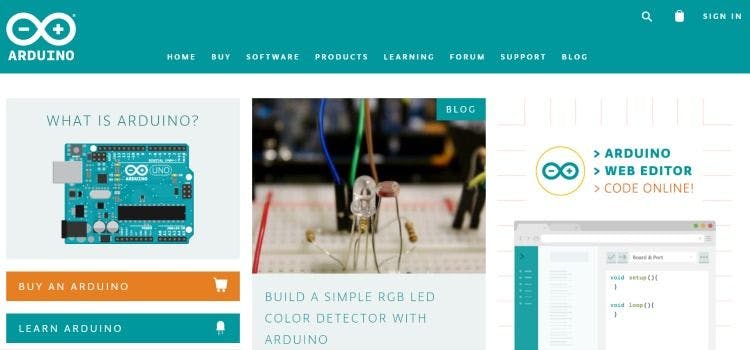
What to Buy: Original Arduino - right from the source
Unsurprisingly, the main thing you can buy on Arduino’s website is Arduino boards. All of Arduino’s hardware and software is fully open-source. That means that you have all the documentation at your fingertips whenever you need it. Every code library it publishes and every board it manufactures is published to the open community, which can then share thoughts, improvements, and additions. When you buy from Arduino, you not only have their support and full access to their knowledge base, but you also gain access to a dynamic community of Makers that can help you make the most of those resources.
In addition, they host external products as part of their AtHeart program, which basically means that the product is currently supported by the Arduino development environment.
adafruit
adafruit is another heaven for Makers. Much like SparkFun, the shopping experience is carefully planned to keep Making at its heart.
All of its components are kits that have detailed descriptions and tutorials. adafruit also has a very active blog that features projects from all over the internet. It even has a weekly video blog called “Ask an Engineer” with adafruit CEO Limor Fried, AKA Ladyada.
The electronics the company manufactures are uniquely curated to fit all sorts of projects, such as wearables and robots. adafruit puts a strong emphasis on the educational aspect of Making and has an engaged online community consisting of Makers and DIY enthusiasts that share their knowledge and projects on their active forum. All of adafruit’s hardware and projects are open source, and the company encourages its community to customize and contribute back to the Maker community, allowing more learning and improvement at every level of experience.
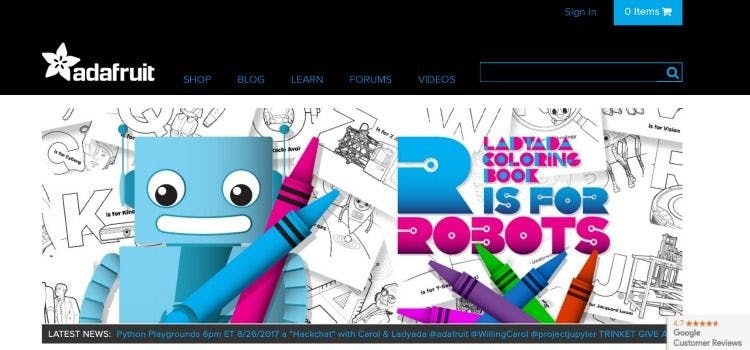
What to Buy: Adabox and wearable microcontrollers
An interesting service introduced by adafuit is the Adabox — a curated box of DIY electronics every three months. This unique service gives Makers the opportunity to get exposed to new possibilities and components they may not have used before.
adafruit also manufactures two microcontrollers — Gemma and Flora. Its wearables “department” stocks:
- Conductive textiles
- Custom battery packs
- Sensors and LEDs
- Wearable project kits especially for beginners
In addition to hardware, adafruit has featured some cool wearable projects and tutorials over the years on its website, including a GPS-enabled jacket and glowing Firewalker Sneakers!
Robotics and Kits
This next section will cover online stores that focus their business mainly on robotics and kits. While these sites also sell individual components, their main business is focused on unique types of kits that they distribute or manufacture.
Parallax
Parallax focuses mostly on the robotics market. It designs, develops, and manufactures two types of micro-controllers: “Propeller” and “BASIC stamp”. It also sells accessories, peripherals, and kits, including these MCUs.
Graphic Programming Tool
Parallax developed a graphic programming tool called BlocklyProp to help its users learn how to program with Parallax. BlocklyProp allows you to work with Parallax’s Propeller multicore microcontroller to create blocks of readable text introducing you to programming methods in a visible and logical way which is a great way to get into programming, making it a useful educational tool.

What to buy: EdTech Kits
If you’re an educator, you can find some great kits and tutorials on Parallax’s website such as the Boe-Bot and Scribbler. These kits are based on the Parallax microcontrollers and programmed using their BlocklyProp programming tool. They are great because they are self-explanatory, beginner friendly and require no previous programming or soldering experience. Parallax also offers kits with Arduino, so if you don’t want to confuse yourself with too many programming environments and different hardware options, you can always go back to the Arduino.
Solarbotics
Solarbotics has been around since 1992. As you can probably guess from the name, they focus on robotics. More specifically, on BEAM robotics which stands for Biology, Electronics, Aesthetics, and Mechanics.
Although their website may seem a bit outdated, Solarbotics has all the up-to-date components and gadgets, and it adds more projects all the time.
The company’s claim to fame is that “Solarbotics has kits for any skill level, as long as you're not scared of a soldering iron".
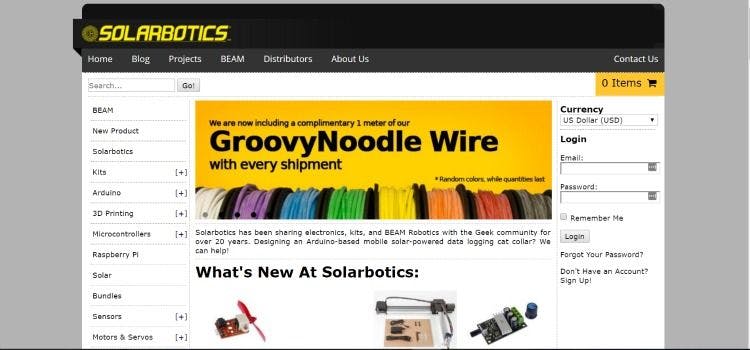
What to buy: BEAM Robots
Solarbotics’ area of expertise is the BEAM robots. The site has a designated area for kits and components of BEAM robots. One great example is Herby the Mousebot, a cute, light-chasing robot in the shape of a mouse. All the kits come packed with full documentation.
Pololu
Pololu has been around since 2001. The bulk of its business is in designing and manufacturing electronics products. The company provides extensive documentation, including examples and software libraries that are often used as references by companies such as Adafruit and SparkFun.
Pololu has an ever-growing catalog of mechanical parts, including:
- A wide selection of micro metal gear motors
- Basic parts, like wheels (which are still difficult to find elsewhere)
- More unique parts, like ball casters
Pololu emphasizes accessibility to all, from “relatively simple carriers that make the latest electronics components, like gyroscopes and time of flight distance sensors, more accessible to Makers without advanced manufacturing equipment, to advanced integrated solutions for things like motor control.”
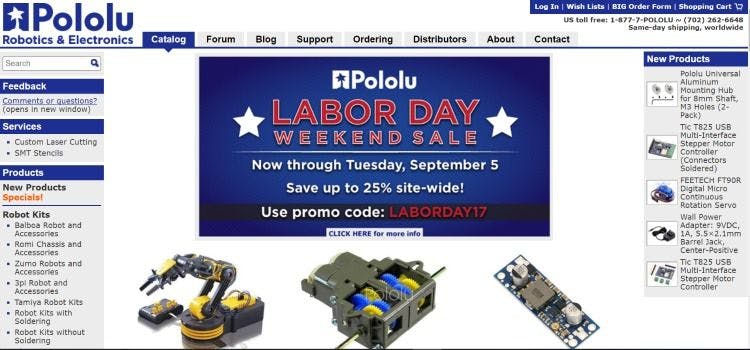
What to buy: Laser and Stencil Cutting Services
Pololu offers a low-cost laser cutting service where you can submit designs to be cut. It also offers a stencil-cutting service for those who assemble their own surface-mount electronics designs. This can save you time and money, and give you quality results at a reasonable price, without needing to invest in expensive equipment.
Mammoth Electronics
Mammoth is an electronics parts retailer specializing in DIY electronics for Makers, hobbyists, university students, and electronics manufacturers. It offers a wide variety of components and attractive prices on generic basic components, such as resistors, knobs, and enclosures for prototype boards.
Bonus services
Mammoth also offers custom enclosure drilling, powder-coating, and printing (using a UV printer) for builders who want to release pedals of their own design.
Customer service
Mammoth is very responsive to their customers, with high availability over the phone and by email for assistance and troubleshooting.

What to buy: Guitar Pedal Kits
Mammoth manufactures kits for guitar pedals that you can’t find anywhere else. Each kit has detailed instructions designed to be as clear and informative as possible. This way, builders of any experience level can give the kits a try.
Small-Medium Online Stores
All Electronics
All Electronics was founded in 1967 and offers both new and used electronics. Unlike most of the distributors in this post, it has a physical store in California. Despite the website’s somewhat old-fashioned design, All Electronics can be a great resource for your needs. It has new products all the time and has a clearance section with great prices. In its Arduino-compatible section, it also offers some Adafruit and SparkFun components.

Killer Feature: Rare & secondhand parts
All Electronics is a good place to stock up on your day-to-day generic components and basic things like resistors, capacitors, and such. All electronics is also a good place to look for unusual components or ones that are no longer manufactured since they buy excess inventory from other suppliers and also sell second-hand parts.
Jameco
Jameco is a well-established distributor offering more than 50,000 components from name brands and generic manufacturers. This eclectic blend allows Jameco to offer attractive pricing for hobbyists and Makers with low-volume purchases. Jameco has a Special Buys area with some extremely cheap components, so if you find what you need here, chances are it’ll be dirt cheap compared to the competition.
A Unique, Interactive Community
Jameco also has a community hub called club Jameco where designers and Makers can earn money from their designs. On this platform, Jameco also offers assistance to Makers and designers with their creative process. Once the project is approved, Jameco bundles its components and sells it as a kit, and the creator receives commission for the sale.

What to buy: Music console Kits
In the electronics designer kit zone, you'll find kits manufactured exclusively by Jameco. One of their specialties is music-oriented kits such as the Atari Punk Console Kit - an awesome sound synthesizer that creates a sequence of tones controlled by a potentiometer.
In addition, Jameco’s Electronic kits mall you can find a kit for every need. The kits are sorted by topics: energy, 3D, Arduino, Parallax, light, wireless, and designer. In each area, you’ll find more sub-categories so you can really dive into a subject and get lots of useful information and know-how.
Large Electronics Distributors and Manufacturers
In the last section, we'll look at large electronics distributors and manufacturers. Since these companies mostly cater to the professional sector, they are oriented towards production-level and large-scale orders. Therefore, it may be more difficult to find the specific things you’re looking for.
That being said, it is evident that these companies, too, see the potential of hobbyist and Maker projects to become successful products that progress to mass manufacturing. This may be one of the reasons that they invest in the Maker market, as you’ll see in this next chapter.
The best thing about these companies is that they sell high-quality components, and they will usually have most or all of the components you could ever possibly need. The downside is that if you don’t know exactly what you’re looking for, you may get lost on the sites. One way or the other, it’s good to explore all your options before you decide where to buy.
Digi-Key Electronics
Digi-Key is one of the largest electronics distributors in the world. With international coverage, Digi-Key aids engineers and innovators through the entire creation process “from prototype to production,” as their slogan says.
Variety and Versatility
From the start, Digi-Key focused its marketing efforts on direct marketing for electronics hobbyists. Therefore, it is no wonder that they are one of the only large distributors that allows customers to buy single pieces of almost every component (including resistors!) in its inventory, which is a big advantage. Digi-Key has a very large variety of components, including those specifically designed for Makers, such as SparkFun and Adafruit products.
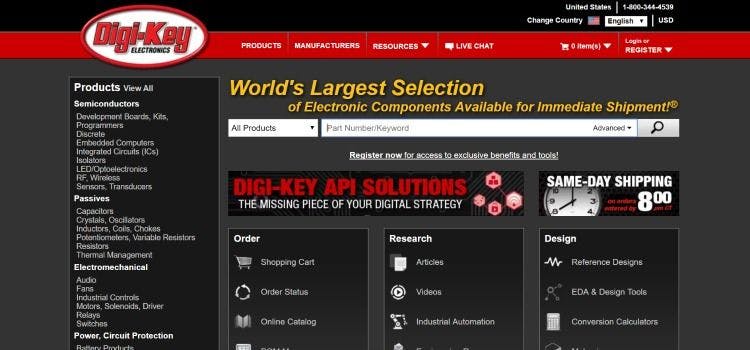
For Makers: Digi-Key’s Maker.io
From the start, Digi-Key focused their marketing efforts on the electronics hobbyist market. Recently, they even launched Maker.io, a unique platform that sets out to support Makers and prototypers from project-planning and building stages all the way to production and distribution — “From Maker to Market”.
Mouser Electronics
We asked Mouser how it approaches the Maker market. A representative explained that “at every level, Mouser Electronics, the industry’s New Product Introduction leader, puts the needs of our customers first — including focusing on what the Maker community requires. We make it a priority to stock the newest products and leading technologies from our 600+ manufacturer partners, giving Makers, students, engineers, and buyers an edge and helping them complete their projects quickly and speed time to market.”
Mouser knows what Makers need to succeed and aims to provide the development boards and open-source hardware you need to speed the time to market for new products, including products from:
- Arduino
- BeagleBoard
- Seeed Studio
- Adafruit
- SparkFun and more.
Mouser also knows that what’s important to Makers goes beyond access to brand names, and emphasizes:
- Access to the latest technologies
- Ease of ordering with no minimum orders
- Getting products in your hands as soon as possible

For Makers: Empowering Innovation Together
Mouser teamed up with Grant Imahara to create Empowering Innovation Together. The program is designed to inspire and inform today’s innovators through enlightening videos, articles, e-books, and other educational content.
Newark element14
Newark element14 is part of Premier Farnell Group, a global distributor of technology products and solutions for electronic system design, maintenance, and repair. Premier Farnell trades as Newark element14 in North America, Farnell element14 in EMEA, and element14 throughout Asia Pacific. In their stock, they hold products from 3,500 different brands.
Special offers for Startups
Newark element14 offers special bundles, especially for Startups and Makers. These bundles provide access to expert advice and consultation on product design and manufacturing – which is especially useful if you are new to the industry or have limited resources to accomplish your goals.
As a manufacturer of some of the world’s most popular Single Board Computers (Raspberry Pi™, BeagleBone® Black, BBC micro:bit), Premier Farnell has the knowledge, expertise, and resources to help start-ups through the design, production, and commercialization process.
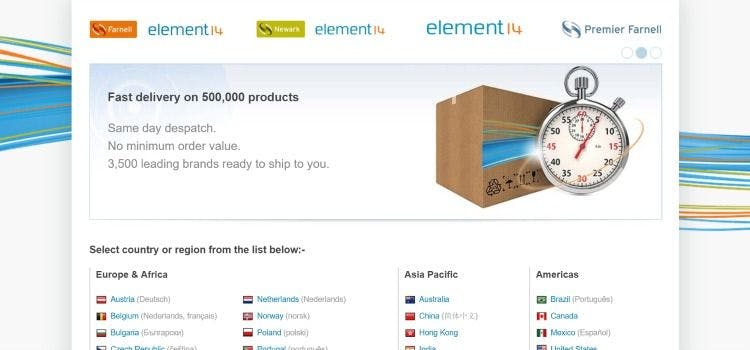
For Makers: element14 Community
According to Premier Farnell, “The element14 Community is an online network that connects engineers, manufacturers, inventors, and other innovators in the Maker movement. The community launched in 2009 as a way for the company to engage more directly with its customers. The community quickly evolved with the creation of new programs and content to better serve the changing needs and interests of its membership of electronics innovators. The element14 Community provides support and inspiration through a combination of articles, design challenges, and road tests, as well as the power of its over half a million global members with their combined experience and knowledge.”
Microchip
Microchip is one of the most popular suppliers and producers of a variety of components, including interface devices, switches, and PIC® and AVR® microcontrollers. Not only does the company do an excellent job of balancing cost and quality, but it also makes its components available readily to individual Makers of all skill levels.
Community
Microchip goes beyond internet communities by connecting people in the Maker community in real life. It supports hackathons, connects with creative minds at events, and holds trainings to advance opportunities for success in the Maker movement.
Online, the company supports its Makers by showcasing their creations on social media. It also hosts a variety of community hubs for all interests: troubleshooting, brainstorming, sharing ideas, and collaborating are possible through engaged and supportive board communities like AVRFreaks.
Documentation
For those who prefer to learn online but may not be the chatting type, Microchip has you covered there too. The documentation is thorough and easy to navigate thanks to carefully organized sections and a searchable database.
Training
If you want to tap into Microchip’s vast Maker knowledge but can’t get to an event, it even hosts live webinars and offers a comprehensive tech support resource.
One of the things we love about Microchip is that it never leaves you hanging—everything that you could possibly need beyond just an opportunity to purchase, they seem to have thought of.

For Makers: Get Launched
Microchip also makes it clear that it cares about your success as an innovator with the Get Launched program. Microchip told us that “entrepreneurs with innovative ideas, breakthrough technologies, or prototypes can sometimes struggle to find the right semiconductor partner.” Of course, the right partner is crucial to success, which is why Microchip started the Get Launched. The program, Microchip says, leverages its network of partners to “provide experience and expertise in areas such as design, contract manufacturing, business resources and production.” These aspects of the innovation process can often be daunting, but Microchip helps you increase your odds by providing access a network of knowledgeable industry experts to help clear the fog around the steps to success.
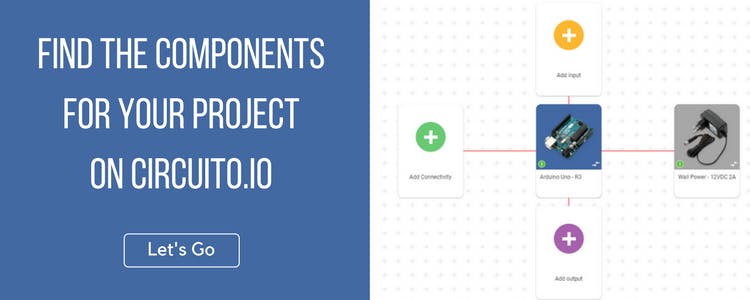
There are many options for buying electronics online, and the list goes on and on. Some are more Maker-oriented and hobbyist-friendly, while others are more focused on the professional market. Some of the companies manufacture their own components while others serve as distributors, and some do both.
Wherever you choose to buy your electronics, it’s always good to compare before committing. You can also use Octopart, which is an online search engine that compares between hundreds of distributors and thousands of manufacturers. Another option you should definitely consider that wasn’t discussed in this post is buying components from general online stores such as eBay and Amazon. At times, these may be the most economical choices, however, you may want to take into consideration a few more factors such as product quality and service and support which will most likely be better when buying from a supplier focusing on electronics distribution or manufacturing.
We hope you found this post useful and would love to hear your feedback in the comments. If you think there are important retailers that we missed (and we’re pretty sure there are), we’d love to add them in the future.
